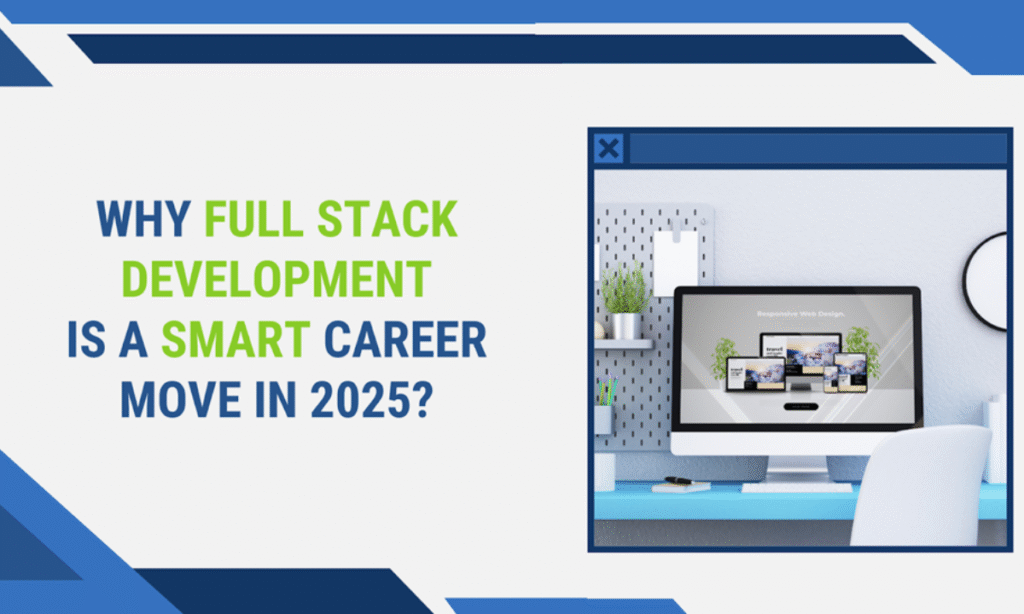Bangalore’s tech ecosystem is accelerating at warp speed. With 70% of Fortune 500 India HQs based here, companies demand developers who ship products end-to-end, not just specialists.
Full Stack Development has become the linchpin of this agility, commanding ₹14L+ average salaries for professionals who bridge frontend finesse and backend robustness (Naukri 2025).
The 2025 shift is clear: siloed Frontend Developer or backend developer roles are merging. Startups like Flipkart now prioritize full-stack talent to launch MVPs 40% faster and slash team sizes by 60%. This convergence isn’t just efficient – it’s career-proofing.
For developers, mastering the full stack means unlocking unparalleled versatility in Bangalore’s competitive landscape. Let’s dissect why this skillset dominates 2025 hiring.
The 2025 Full Stack Edge – Unifying Frontend & Backend
The era of siloed developers is ending. In 2025, companies prize Full Stack professionals who seamlessly integrate user experience with server logic, slashing project timelines and communication gaps. Consider how Myntra reduced feature deployment from 3 weeks to 4 days by shifting to full-stack teams.
Also, the career advantages are undeniable:
- Salary Premium: Full-stack developers earn 42% more than specialized frontend developers or Backend developers (Glassdoor 2025)
- Job Security: 78% of Bangalore tech job posts now explicitly request full-stack skills
- Strategic Influence: Lead entire product cycles instead of fragments
The strategic advantage is clear: full-stack developers speak both “languages.” They optimize PostgreSQL queries while ensuring the React frontend doesn’t choke on the data load. This systems-thinking is why startups pay ₹14L+ for these polymaths.
Frameworks & Tools Dominating 2025 – The Full Stack Arsenal
The 2025 full-stack landscape is defined by convergence frameworks that erase traditional frontend-backend boundaries. Gone are the days of juggling disconnected tools – modern stacks unify development under cohesive ecosystems.
React 18+ and Next.js 14 now dominate frontend-backend integration. React’s concurrent rendering handles complex UIs (like real-time dashboards), while Next.js server actions enable backend logic within components, slashing API roundtrips by 70%. For Bangalore startups like Zepto, this means launching features in days, not weeks.
The database revolution is equally critical. Vercel Postgres brings edge-compatible SQL to full-stack workflows, enabling geo-distributed data for Bangalore’s global SaaS products. Combined with Prisma’s type-safe ORM, developers to ship data-intensive features 40% faster.
DevOps isn’t separate – it’s embedded. GitHub Actions automates CI/CD pipelines directly in repos, while Docker containers ensure “runs locally” ≠ “fails in production.” Mastering these Frameworks and Tools isn’t optional; it separates ₹10L and ₹20L developers.
Bangalore – Your Launchpad to Full Stack Mastery
Bangalore isn’t just India’s tech capital—it’s a full-stack incubator where learning meets opportunity. The city’s Full Stack Developer Course in Bangalore programs have evolved into career accelerators, blending cutting-edge curriculum with unmatched industry access.
Live project immersion sets these courses apart. Students deploy real applications for Koramangala startups, like building IoT dashboards for electric rickshaw fleets or developing AI-powered queue systems for local clinics. These aren’t classroom exercises; they’re production systems handling user traffic from day one.
The toolchain is equally future-proof. Courses integrate GitHub Copilot X for AI-paired programming and Figma’s Auto Design for instant UI prototyping. You’ll master frameworks like Next.js 14 not through tutorials, but by optimizing Unacademy’s live course platforms during peak traffic.
Placement outcomes speak volumes. 94% of graduates land ₹10L+ roles within 90 days – often through direct channels like:
- Infosys Hackathons: Showcasing full-stack MVPs to CTOs
- Whitefield Tech Meetups: Pitching projects to VC partners
- Flipkart Speed Interviews: Fast-tracking top performers
Enrolling in a Full Stack Developer Course in Bangalore means embedding yourself in India’s tech nucleus. The city doesn’t just train developers—it forges product-ready engineers.
Conclusion
Full Stack Development isn’t just a skill—it’s career armor. With Bangalore’s tech giants and startups paying ₹14L+ salaries for developers who ship products end-to-end, versatility now outvalues specialization. The convergence of frontend artistry and backend engineering unlocks unparalleled agility in building everything from AI-driven apps to scalable SaaS platforms.
For those ready to lead, the Full Stack Developer Course in Bangalore delivers more than knowledge: live projects with Koramangala startups, mastery of Next.js 14 and Vercel Postgres, and direct pathways to Flipkart/Infosys roles. 94% of graduates land jobs within 90 days – proof that the city transforms learners into indispensable product engineers.



